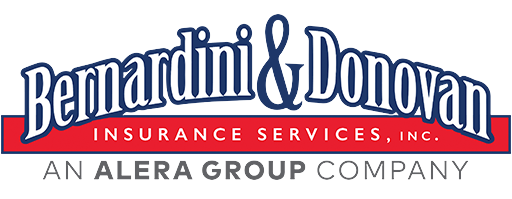 In part one of this blog, we discussed the difference between a small-group and a large-group when it comes to determining what health insurance plan is right for your business and employees. We also discussed the importance of group health plans along with some of the different types of health insurance plans that could be offered by small businesses.
In part one of this blog, we discussed the difference between a small-group and a large-group when it comes to determining what health insurance plan is right for your business and employees. We also discussed the importance of group health plans along with some of the different types of health insurance plans that could be offered by small businesses.
Now, in part II of this blog, Bernardini & Donovan will discuss employer-sponsored health plans (and things to consider) in addition to how to find an appropriate health insurance agent for you and your small business.
Employer-Sponsored Health Plans for Small Businesses
According to health insurance laws, small group health insurance must be made available to be sold to any small business that qualifies for group insurance.
As a small business, your group must be able to prove that you are a viable business by providing some basic business documentation. All insurers generally have the same requirements, but occasionally they will relax the qualifying guidelines in an effort to acquire new business.
Once a group is deemed qualified, they have hundreds of health insurance plan options from which to choose. It is important to have a knowledgeable broker like Bernardini & Donovan Insurance Services, Inc. at your side to help you determine qualification and assist in selecting a plan that meets your coverage needs and budget.
The insurance companies generally require that a certain percentage of employees participate in the employer plan and this percentage varies based on group size and the insurance company selected. Now, to ensure your business stays competitive within the job market, here are three things to take into consideration to guide your decision when choosing employer-sponsored healthcare:
- Preventative care coverage: Most health plans must cover a set of preventive services like shots and screening tests at no cost to you. 10 essential health benefits required by the Affordable Care Act (ACA) for small businesses (1-100 employees) and individual health insurance plans.
Know what coverage matters. First, the top coverages employees look for are preventative care, hospitalization, and copays. Understanding these coverages is your first step to choosing policies that keep your workforce healthy and happy. Talk to our team of specialists to help you balance the cost against these critical needs.
○ Ambulatory patient services (outpatient services)
○ Emergency services
○ Hospitalization
○ Maternity and newborn care
○ Mental Health and substance use disorders, including behavioral health treatment
○ Prescription drug coverage
○ Rehabilitative and habilitative services (those that help patients acquire, maintain, or improve skills necessary for daily functioning) and related devices
○ Laboratory services
○ Preventive and wellness services and chronic disease management
○ Pediatric services, including oral and vision care
Large and small group health insurance policies are designed to provide the best possible coverage for individuals who are part of a specific group.
- Hospitalization coverage: The cost of medical care, especially hospital stays, can quickly add up. This plan can either a) help you prepare your budget for unexpected medical costs resulting from a hospital stay or b) pay your benefits for other medical services depending on the policy when you are confined to a hospital, whether the reasons are planned or unplanned, and can cover short or long term stays.
- Copay coverage: A copayment or copay is a fixed amount for a covered service, paid by a patient to the provider of service before receiving the service. Copayments can vary for different services within the same plan, like drugs, lab tests, and visits to specialists.
- Generally, plans with lower monthly premiums have higher copayments. Plans with higher monthly premiums usually have lower copayments.
Choose who gets covered. Second, you need to decide if everyone will qualify for the same policy. Will you offer coverage to part-time employees? How will you treat their dependents? The amazing thing is that you do not need to choose a “one size fits all” policy. Your insurance agent will help you understand your workforce and choose policies that comply with the ACA while meeting your needs and those of your employees.
Decide how much you will contribute. Third, you will decide how much of these policies you choose to subsidize. Some employers opt to pay for the entire policy, others offer a sliding cost scale based on coverage, and some only cover a flat percentage of the employee’s total health care costs. It’s important that you offer “affordable” coverage to avoid any fines associated with the ACA, so work with your provider to understand median policy costs in your region and how these costs stack up against your employees’ wages and cost of living.
Things to Consider with an Employer Health Plan
When you own a small business with less than 50 total employees, you are not required by law to offer a health plan for your employees; however, you may still want to. Before choosing a group health plan for your employees, there are a few things to consider.
First, you need to keep both your business goals as well as the benefit of your employees in mind. This is a careful balance, but it can be done with the right considerations along the way. Use this list as your guide through the process:
❏ How much can your business pay and how much can your employees pay? In general terms, plans come in terms of premiums. The higher the premium, the lower the costs out of pocket and vice-versa. Something to consider is how much both your business and your employees can afford in terms of premiums and out of pocket costs when they use the insurance. You will want to find a happy medium that makes both you and your employees happy.
❏ Will you offer one plan or a choice of plans? There are many plans for you to choose from and your biggest decision will be whether you want to offer one or a choice of a few for your employees. You will want to explore all of the options available for your area. One main reason employers offer more than one plan is because some employees want a better plan than the most basic plan and others just want something to meet legal requirements.
❏ Will you offer other plans, like dental and vision? You are not just limited to medical plan offerings. If you want, you can offer your employees both vision and dental offering as well.
❏ How much will you pay for? As a business, you MUST pay a portion of the premiums on behalf of your employees, but are not required to pay for dependent cost. You will want to determine what you will pay for before as a company.
When it comes to evaluating group health plans, health plans vary tremendously. The basic comparison factors are relatively simple, though: analyze benefits, price, and providers of any plan.
Providers – This is an important area you should investigate. Traditional insurance plans allow you to choose your own doctor but managed care plans include preferred provider organizations (PPOs), health maintenance organizations (HMOs), and point of service (POS) plans. These plans often restrict your choices of medical services providers to an approved list. The list could prove crucial in deciding whether to enroll in a given plan.
Price – Compare plans with similar benefits to determine which plan offers the best value for your money. Your employer might offer several options from which you could choose. Keep in mind that a) some companies offer a choice between two insurance plans b) some employers can also provide a basic insurance plan, but they allow employees to purchase more comprehensive insurance as a personal option c) and some companies offer multiple insurance plans.
Benefits – You should research the benefits of various plans to find what each cover. Assessing the following benefits will provide practical help in evaluating policies: find out what co-payments are required for outpatient care and inpatient treatment; find out what kind of copayments are required for generic or name brand prescriptions; understand what your deductible options are and how they will affect the insurance premium.
If you live or operate a small business in Redlands or the Inland Empire and want to learn more about health insurance options, contact the health insurance specialists at Bernardini & Donovan Insurance.
Finding an Agent for Small Business Health Insurance Plans
The value of an agent is not an easy thing to summarize. For starters, an agent sells insurance plans for multiple insurance companies, which means they have a variety of options at their disposal. Agents can help ensure that you pick the right small group health insurance in regards to cost, the plan itself, and more.
The value of an agent is likewise apparent when you need answers to questions concerning group health insurance plans and policies. A reputable agent doesn’t just sell you a policy; they explain it in the finest detail so you understand exactly what you are getting for your money. Your agent is the one you contact when you have to file a claim or if you need to update your policy. When the insurance company has questions concerning an accident or health claim, your agent is the one who acts on your behalf to make sure all of your insurance needs are meant.
If you have any questions concerning insurance coverage for a small group of individuals, we at Bernardini & Donovan can answer your questions and help you get the coverage you need.



 Purchasing group health insurance as a small business owner can be a rather intimidating task. This is especially true when you try to do it all on your own without any help. However, the process can be made a lot easier and less daunting if you let a
Purchasing group health insurance as a small business owner can be a rather intimidating task. This is especially true when you try to do it all on your own without any help. However, the process can be made a lot easier and less daunting if you let a